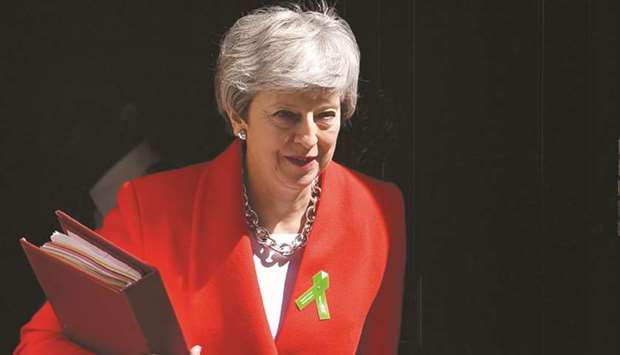The government yesterday postponed Theresa May’s final Brexit showdown in parliament following an outcry over concessions that looked set to speed up the end of her tumultuous spell as premier.
The increasingly isolated Conservative premier is facing the prospect of being forced to resign without have achieved her mission to guide her fractured country out of the European Union after nearly 50 years of membership.
She had insisted Wednesday that she would try to ram her version of Brexit through parliament on the fourth — and what would be her last — attempt in the week starting June 3.
But the vote was not included on that week’s parliamentary schedule published yesterday.
Government whip Mark Spencer told lawmakers that May’s office “will update the House on the publication and introduction of the Withdrawal Agreement Bill on our return from the Whitsun recess” on June 4.
May had earlier tried to win over politically ambitious holdouts within her own party by promising them she would step down after next month’s vote.
But her end is being brought forward by her decision to hold out the prospect of a new Brexit referendum to the pro-EU opposition.
The move failed to win over any converts and sparked a mutiny within the top echelons of her government and party ranks.
Senior Conservatives from the so-called 1922 Committee met privately on Wednesday to discuss making rule changes that could topple May in the coming days.
She will meet the group’s leader today for talks at which seemingly everyone expects May to disclose when she will step down.
What happens to Brexit in the meantime is unclear.
The lengthy and rancorous standoff has delayed Britain’s departure from March 29 until October 31 — a date that might be extended still further.
May’s woes were underscored when Andrea Leadsom — one of Cabinet’s strongest Brexit backers — quit her post as the government’s representative in parliament over its handling of the crisis.
“No one has wanted you to succeed more than I have, but I do now urge you to make the right decisions in the interests of the country, this government and our party,” Leadsom told May in her resignation letter.
May thanked Leadsom for her “passion, drive and sincerity”. Yet she also took issue with Leadsom’s assessment of her Brexit strategy — a stance that some UK media interpreted as sign that she still intended to fight for her job.
“I do not agree with you that the deal which we have negotiated with the European Union means that the United Kingdom will not become a sovereign country,” May wrote in reply.
Leadsom was not the most senior Cabinet member of the nearly three dozen who have resigned under May’s watch. But she held on to a powerful post that set the parliamentary agenda and decided which bills come up for a vote.
Her position was filled yesterday by Mel Stride, who moves over from his current role as paymaster general in the UK treasury. Leadsom is just one of more than a dozen declared or presumed contenders for May’s job.

Theresa May
